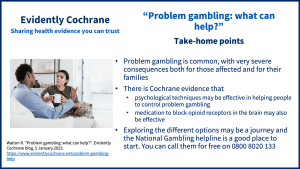In a blog for people who think they may have a problem controlling their gambling, or who are concerned about someone who does, GP Robert Walton looks at recent Cochrane evidenceCochrane Reviews are systematic reviews. In systematic reviews we search for and summarize studies that answer a specific research question (e.g. is paracetamol effective and safe for treating back pain?). The studies are identified, assessed, and summarized by using a systematic and predefined approach. They inform recommendations for healthcare and research. on what might help.
Take home points
Had a flutter recently and lost? Then did you get straight back on and try to win it back? Then did you lose again?
If your gambling is out of control you’re not alone. According to a YouGov survey more than a million people in the UK have problem gambling. As a general practitioner working in the NHS over several decades, I have seen at first hand the harm that gambling causes both to gamblers themselves and to their families.
Heavy financial losses leading to serious debt are sometimes the very first outward sign of a problem that has lain hidden for years. The YouGov survey found that about 12 million people in total in the UK had their lives affected by a family member with problem gambling.
What may help you gain control over gambling?
The talking treatment
Sometimes seen as a cure for all ills, cognitive behavioural therapy (CBT) is probably the treatmentSomething done with the aim of improving health or relieving suffering. For example, medicines, surgery, psychological and physical therapies, diet and exercise changes. with the strongest base in Cochrane evidence. Working with a trained therapist people can identify cycles of thought that lead to gambling, spot triggers to those cycles and then work out ways of interrupting them. A recent Cochrane ReviewCochrane Reviews are systematic reviews. In systematic reviews we search for and summarize studies that answer a specific research question (e.g. is paracetamol effective and safe for treating back pain?). The studies are identified, assessed, and summarized by using a systematic and predefined approach. They inform recommendations for healthcare and research. Psychological therapies for pathological and problem gambling (published November 2022) showed that these simple and straightforward methods may lead to a large reduction in how often people gambled and a moderate reduction in financial losses. So the problems resulting from gambling suffered by children and families may potentially be avoided. And for the person directly affected by problem gambling there were moderate reductions in depression and anxiety
Medication for problem gambling
A large body of medical research suggests that problem gambling is linked to specific neural circuits in the brain which may be modified by drugs that block opioid receptors. It may seem like an odd idea that such a complex behaviour can be affected by drug treatment but in the end the proof of the pudding is in the eating so does taking these reduce the riskA way of expressing the chance of an event taking place, expressed as the number of events divided by the total number of observations or people. It can be stated as ‘the chance of falling were one in four’ (1/4 = 25%). This measure is good no matter the incidence of events i.e. common or infrequent. of problem gambling?
It was interesting to read a recent Cochrane Review Pharmacological interventions for the treatment of disordered and problem gambling (published September 2022) showing that some people taking opioid antagonist medications such as naltrexone may gain small but potentially important reductions in gambling symptoms and a reduction in the amount of money spent on gambling.
Getting help
So Cochrane evidence suggests that there are options that may help people to gain control over problem gambling. None of these options provides a sure fire cure and some treatments may work better for some people than for others. Exploring the different options may be a journey and the National Gambling helpline is a good place to start.
Join in the conversation on Twitter with @rtwalton123 @CochraneUK or leave a comment on the blog.
Please note, we cannot give specific medical advice and do not publish comments that link to individual pages requesting donations or to commercial sites, or appear to endorse commercial products. We welcome diverse views and encourage discussion but we ask that comments are respectful and reserve the right to not publish any we consider offensive. Cochrane UK does not fact check – or endorse – readers’ comments, including any treatments mentioned.
Robert Walton has nothing to disclose.



